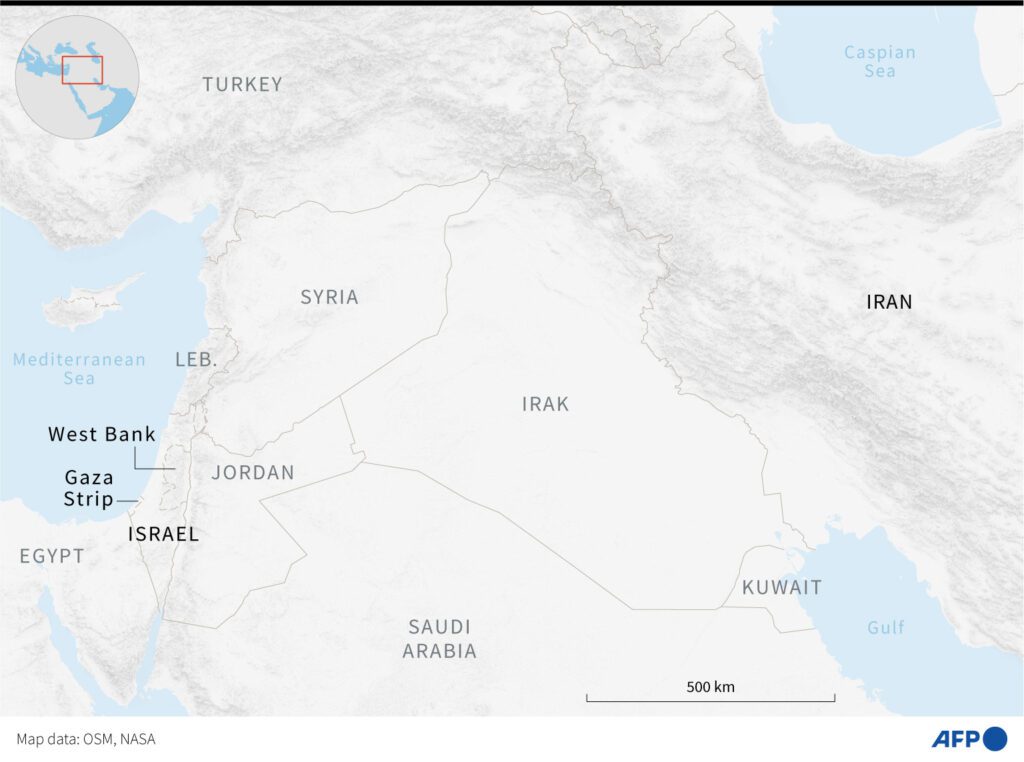
This video grab from AFPTV taken on April 14, 2024 shows explosions lighting up Jerusalem sky during Iranian attack on Israel. Iran’s Revolutionary Guards confirmed early April 14, 2024 that a drone and missile attack was under way against Israel in retaliation for a deadly April 1 drone strike on its Damascus consulate.
Photo: AFPTV / AFP)
Israel has yet to announce how it will respond to Saturday’s Iranian attack on its territory. Nevertheless, following April 13th, Western states’ began calling for Israel to “refrain” from a military response,—prompting criticism from U.S. Republican politicians and conservative commentators alike.
The U.S. and EU non-appeasement policy towards such aggressors as Russia does not seem to extend to Iran—instead, Israel gets warned not to further escalate tensions.
The Islamic Republic launched around 300 missiles and attack drones against Israel on Saturday. Reportedly, this caused only minor damage, as Israel was able to neutralise almost all of the incoming weaponry. This was the first direct attack by one of Israel’s core enemies, which helped to plan Hamas’s terrorist massacre of Israeli civilians on October 7th. This follows Iran waging a proxy war against the Jewish state for decades by supporting Islamic militant groups like the Palestinian Hamas and the Lebanese Hezbollah.
Saturday’s attack was a response to a suspected Israeli air strike on the Iranian embassy in Syria on April 1st, which killed thirteen people, including two Iranian generals. Iran’s U.N. ambassador, Amir Saeid Iravani, said his country’s action was necessary and proportionate.

Israeli Prime Minister Benjamin Netanyahu vowed Israel would achieve victory, but it is not yet known what the response will be. Nevertheless, his country’s Western allies have cautioned Israel by urging the country not to escalate tensions in the region, which is already simmering with the war in Gaza and the civil wars in Syria and Yemen).
U.S. President Joe Biden told Benjamin Netanyahu to “take the win” and “think carefully” about retaliating for Iran’s attacks, and also made it clear the United States would not participate in any Israeli counter-offensive against Iran. German Foreign Minister Annelena Baerbock seemed to want to lecture Israel by stating: “The right to self-defence means defence against an attack. Retaliation is not a category in international law.” French President Emmanuel Macron also urged Israel to avoid any further escalation, while British Foreign Secretary David Cameron said it is time for Israel “to think with head as well as heart.”
Josep Borrell, the EU’s foreign policy chief, who has regularly lambasted Israel for waging a war against the terrorist group Hamas in Gaza, not only called for de-escalation in the conflict between Israel and Iran but went as far as saying “the EU needed to have the best possible relations with Iran,” after speaking to Iranian Foreign Minister Hossein Amirabdollahian on Sunday. This message is in sharp contrast to how the EU has responded to Russia’s invasion of Ukraine. EU leaders are unwilling to negotiate with Russia and are providing weapons to Ukraine.
Calls for caution and restraint have provoked a backlash in conservative and right-wing circles. “Israel has every right to defend itself and respond with any force necessary to neutralise the threat posed by Iran’s terrorism,” tweeted Republican Florida Governor Ron DeSantis.
Israel has every right to defend itself and respond with any force necessary to neutralize the threat posed by Iran's terrorism.
— Ron DeSantis (@GovRonDeSantis) April 14, 2024
Florida stands with Israel.
“I will continue to engage with the White House to insist upon a proper response. The Biden Administration’s undermining of Israel and appeasement of Iran have contributed to these terrible developments,” said the Speaker of the U.S. House of Representatives, Mike Johnson. Meanwhile, former President Donald Trump blamed Joe Biden, saying Iran attacked, “because we show great weakness,” and “it would not have happened if we were in office.”
An analysis by Fox News notes that while Trump withdrew from a nuclear deal with Iran and imposed new sanctions on the country, Biden waived sanctions on Iran’s cash-starved economy, and released “as much as $10 billion into the coffers of the Islamic Republic.” As Richard Goldberg, a former member of Trump’s National Security Council, told Fox News:
It would be a huge mistake to pull Israel back from a military retaliation, but it’s downright insanity to keep $10 billion accessible to Tehran in the aftermath. The president needs to lock down all the money he made available to Tehran these past months.
In a commentary for the Daily Mail, Scottish journalist Andrew Neil writes that real de-escalation in the region happened under Trump when Israel normalised its relationship with Arab nations in the Middle East, and “the rewards in terms of trade, military cooperation and, above all, the mingling of peoples at the highest level, have been substantial.” He goes on to write that “along with the Americans, Saudi Arabia fed Israel with vital intelligence about Iranian intentions so that Israel could prepare for the attack.”
With regards to Western nations calling for restraint after Iran’s attack, Neil writes:
If so many weapons of destruction had rained down on Britain, would we be listening to those urging caution, nodding thoughtfully at such sage advice and agreeing that it would probably be best for all concerned if we just sat on our hands? I suggest that any UK government which went along with that would quickly be driven from power.
